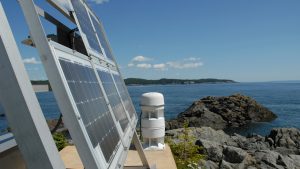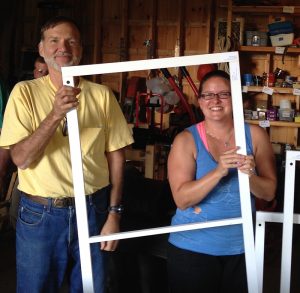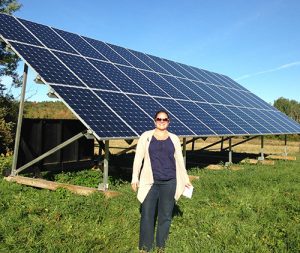Sharon Klein is helping to galvanize community energy in Maine
Exploring whether small projects can inspire major community energy initiatives in Maine
 Look to your right or left on the interstate in Maine, and you’re almost as likely to spot a charging station or field of solar panels as you are a toll plaza. Maine’s rush to promote sustainable energy is generally considered positive and necessary, but, like a Tesla racing up I-95, it risks leaving some smaller communities behind.
Look to your right or left on the interstate in Maine, and you’re almost as likely to spot a charging station or field of solar panels as you are a toll plaza. Maine’s rush to promote sustainable energy is generally considered positive and necessary, but, like a Tesla racing up I-95, it risks leaving some smaller communities behind.
Dr. Sharon Klein, an associate professor in the University of Maine School of Economics and a fellow with the Mitchell Center for Sustainability Solutions, is interested in energy justice, or making sustainable energy more accessible to underrepresented groups (like people of color, low-income individuals, and rural populations). She believes that community energy, or collaborative efforts among neighbors to address energy issues, could be the key to making sustainable energy available to all communities. Specifically, she is studying how workshops to provide residents with energy-saving window inserts can kickstart community energy initiatives.
“Part of what needs to happen in each of these different communities is to start that conversation about what the energy goals are for different community members, for the local government, and everybody that’s involved,” she said. “A community workshop to build window inserts can be a catalyzing event that starts that process.”
With funding and support from the Mitchell Center, Klein, in collaboration with the Penobscot Nation and the nonprofit organization WindowDressers, held a window insert building workshop in Fall 2021, afterwards using survey methods to record Penobscot and Passamaquoddy citizens’ preferences for different energy options. She is now using this work as a springboard to support larger energy initiatives in these communities while investigating the viability of a state-wide community energy support network.
Where there’s a window, there’s a way

A window insert is composed of a wooden frame wrapped in plastic and lined with weather stripping; installed on the interior side of windows, they reduce heat loss and save residents energy and money.
Klein first began organizing window insert workshops, with the support of WindowDressers, in 2015 as a service-learning opportunity for her students. WindowDressers is a volunteer-run nonprofit that helps Northern New England residents reduce heating costs, fossil fuel consumption, and CO2 emissions by reducing heat loss through windows. The inserts are free to those community members that cannot afford them; instead, they donate their time and labor to local community build workshops. Having worked with the organization for over half a decade, Klein now serves on the organization’s board of directors.
“Sometimes, when you pull the thread of community engagement, you never know where it’s going to head, and that kind of happened to me in 2015 when I first got started with WindowDressers,” she said.
Klein’s doctoral research focused on utility-scale solar energy efforts, and while she was working with WindowDressers, she began to study “grassroots” community solar. Community solar is widely understood as an arrangement in which private developers create solar farms and offer community members the opportunity to invest in the array and receive credit on their electric bill for their share of the energy that it generates. However, “grassroots” community solar is significantly different in that the community itself installs the solar panels on municipal buildings or land, owning the panels and the energy they generate outright.
As different contacts around Maine reached out to Klein for community solar advice, she began to wonder if a relationship could be drawn between organized community workshops and the success of community-led energy initiatives, like solar installations.
“What I’m envisioning is that the first community energy event, the window inserts, helps to get people talking together, pulls out the people who are interested, and gets them working together so that they can go on to other projects,” she said.
Energy justice through community energy
Klein connected with the Penobscot Nation while working on the Future of Dams project, a multi- university effort to develop a stakeholder-engaged decision-making framework regarding the future of different kinds of dams in New England. During her involvement, Klein became acquainted with the adverse economic and cultural effects felt by the Penobscot Nation due to energy infrastructure like dams. Penobscot community members raised questions about pursuing other forms of energy besides hydropower and the possibility of promoting more energy efficiency in Wabanaki communities, and Klein saw her community energy research as a way to address those questions.
“I wanted to go back to the Penobscot Nation, to the people who said that they were interested in solar and energy efficiency and see if there may be something we could work on together,” she said.
The window insert building workshop took place over five days in the Fall of 2021, co-led by local coordinator Shantel Neptune and Passamaquoddy undergraduate research assistant Jasmine Lamb. The workshop was set to take place on Indian Island, but, two weeks before the event, the island was shut down due to COVID-19 concerns. Luckily, the Mitchell Center emerged as a willing host for the workshop. Participants ultimately built 113 inserts for 12 Penobscot citizens. Following the workshop, survey results showed overwhelming interest in renewable energy, but about two-thirds of respondents had not heard of community solar. In many interviews community members described their energy goals for the community, but often struggled with describing how to achieve those goals.
Lamb also conducted her own survey and interviews with the Passamaquoddy Tribe as an independent project, expanding the reach of Klein’s research and laying the groundwork for future partnerships. Lamb is now the chair of a citizen committee at the Passamaquoddy Reservation at Sipayik (Pleasant Point), where they will be conducting a window insert workshop in Fall 2023, supported by Klein and WindowDressers.
“You need someone who knows people and knows how to get things done, and Jasmine Lamb has really changed the course of the project for the better,” Klein said.
A network to LEAN on
 Since completing the initial workshop with the Penobscot Nation, Klein has helped to secure two Service Provider grants totaling $75,000 from the State of Maine to help Passamaquoddy communities at Sipayik and Indian Township, the Town of Millinocket, the City of Eastport, the Penobscot Nation, and the Houlton Band of Maliseets meet the requirements for enrolling in the Maine Community Resilience Partnership (CRP). This initiative, managed by the Governor’s Office of Policy Innovation and the Future, offers communities support for climate mitigation and adaptation activities through grants and other direct services. After Millinocket, Eastport, and Sipayik enrolled in the CRP in August 2022, Klein helped these communities secure two Community Action Grants from the CRP totaling $175,000 to help meet their energy efficiency goals and build capacity for future action. She also assisted community members at Sipayik with securing a Maine Service Fellow through Volunteer Maine to direct their window insert build activities.
Since completing the initial workshop with the Penobscot Nation, Klein has helped to secure two Service Provider grants totaling $75,000 from the State of Maine to help Passamaquoddy communities at Sipayik and Indian Township, the Town of Millinocket, the City of Eastport, the Penobscot Nation, and the Houlton Band of Maliseets meet the requirements for enrolling in the Maine Community Resilience Partnership (CRP). This initiative, managed by the Governor’s Office of Policy Innovation and the Future, offers communities support for climate mitigation and adaptation activities through grants and other direct services. After Millinocket, Eastport, and Sipayik enrolled in the CRP in August 2022, Klein helped these communities secure two Community Action Grants from the CRP totaling $175,000 to help meet their energy efficiency goals and build capacity for future action. She also assisted community members at Sipayik with securing a Maine Service Fellow through Volunteer Maine to direct their window insert build activities.
One of the most significant achievements to come out of the tribe’s work with Klein has been securing a 4-year, $1.125 million Environmental Protection Agency (EPA) grant to support her project, “The role of state networks in advancing community-initiated and engaged sustainably energy action in underserved communities.” The grant, submitted by Klein, the Penobscot Nation, and the Passamaquoddy Tribe in April 2022, will be used to study the CRP as a tool to support community energy action in underserved communities. A Sustainable Energy Coordinator will be hired through the grant to assist both tribes in applying for CRP grants and implementing different interventions to meet the communities’ climate action goals.
Klein has also helped facilitate two more inter-tribal, million-dollar-plus grant proposals to the EPA and Department of Energy (DOE) to support representatives from all five Wabanaki communities with meeting their residential heat pump and energy efficiency goals. She is also collaborating with representatives from each tribe and A Climate to Thrive (ACTT) on a second DOE grant proposal to develop a program to support the development of community-owned solar for each community.
In her Mitchell Center Sustainability talk on April 4, Klein described the CRP as a strong foundation for a Local Energy and Climate Action Network (LEAN). A LEAN, such as the Vermont Energy and Climate Action Network, is a network designed to connect different energy committees and sustainability organizations to leverage their collective knowledge for the benefit of all the communities in a state or region. While there are a variety of organizations across Maine that fill some of the roles of a LEAN, including WindowDressers, A Climate to Thrive, the Sierra Club’s Climate Action Teams, and the Maine Municipal Association, none check all the boxes. Even the CRP focuses mainly on funding, with peer-to-peer support encouraged in geographic pockets by Regional Coordinators and Service Providers.
“We don’t have [a LEAN] in Maine. We have different groups that are taking a piece of that, but we don’t have this coordinated effort at the state level that does everything LEANs in other states do,” Klein said.
As an additional component of the $1.125 million EPA grant, Klein will investigate the possibility of creating a LEAN in Maine by uniting the CRP and all of the other organizations working on community-led climate and energy action in the state. Supported by a Mitchell Center New Initiatives grant, Klein will convene a half-day LEAN planning meeting of these organizations on June 1, 2023 at UMaine (with a Zoom option) to discuss what a Maine LEAN should look like, how it should be managed, by whom, and what roles different individuals/entities should take on. Additionally, she convened a meeting of UMaine researchers in May to plan for how community-engaged, interdisciplinary research can support the development and implementation of the LEAN.
“There are so many incredible individuals who are pulling together so many things across the state and it would be great for people to have access to them all in one place, this one stop shop where they could get in touch with whoever they need to, all of these movers and shakers,” she said.
